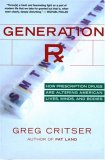Summary | Excerpt | Reviews | Beyond the Book | Readalikes | Genres & Themes | Author Bio

Critics' Opinion:
Readers' Opinion:
First Published:
Oct 2005, 288 pages
Paperback:
Jan 2007, 320 pages
 Book Reviewed by:
Book Reviewed by:
BookBrowse Review Team
Buy This Book
The statement registered in
establishment realms, a further worry
to pharma, when, in 1978, a number of
influential medical journals began to
consider banning prescription drug ads
in their pages. As Steve Conafay,
then a lobbyist for Pfizer, recalls, "There was definitely the feeling that the
industry was under attack and that
something big had to be done." Donald Rumsfeld, then the CEO of G. D. Searle,
Inc., makers of a wide variety of
drugs and chemicals, summed up the
general attitude when, upon greeting
FDA Commissioner Donald Kennedy, he "sat
down across from me," recalls
Kennedy, "slumped a little, and said, 'What are we doing wrong?'"
With Reaganism ascendant, the question
quickly turned into:
What is the government doing wrong? For Engman, now ensconced in
PMA's head office, the question should
have been: What can I wring out of
the new political reality — Reagan's
pronounced antiregulatory bent — that
will directly benefit my membership, the
nation's brand-name drug makers?
Certainly many of his members were
clamoring for a preemptive strike, with
several advocating an assault on the FDA
and its much hated efficacy
requirements. (Congress had passed a law
in 1962, known as the Kefauver
Amendments, changing the Food and Drug
Act and mandating that makers
of new drugs prove not just that their
products were safe, but that they
actually worked.) The chief of research
at Pfizer, then as now one of the more
politically active pharmaceutical
companies, had been railing against the
efficacy rules for years, saying they
got in the way of delivering good new
drugs.
But Engman didn't think that way. He
wasn't interested in
deregulation for deregulation's sake.
Perhaps it was that consumer bug, or
perhaps it was his heady experience as
leader of an agency that served "the
public." Whatever the exact source of
Engman's reservations, his eventual
choice of legislative priorities finally
came down to one issue: patent
restoration. The subject had bubbled
under the surface of FDA-industry
relations for years. Simply put, the
industry believed that the FDA was eating
up the length of its patents, and
profits, because of its slowness in
processing new drug applications.
Companies with a new discovery had to
file for a patent as soon as possible,
to establish ownership of the idea, but
then had to wait years for approval. By
the time the drug was approved, the
company might have as little as half the
original seventeen years of patent life
usually guaranteed to innovators. That
led to higher prices, longer waits for
new drugs, and a general disincentive to
invest in new medications. It was
true that the studies proving the case
for patent restoration — for laws that
would give pharma additional
compensatory patent time — were weak and
inconclusive, but the essence of the
industry argument struck a nerve with Engman: here again was a case of
overregulation hurting the economy of the
nation and depriving the consumer of an
improved product.
What should Engman's PMA do? Sometime
during the fall of
1980, he got an idea. He would use his
old political contacts to shepherd
legislation to extend pharmaceutical
patents, adding up to seven years of
exclusive marketing time for new drugs
that had taken too long to get through
the FDA approval process.
For a while, all of the old Engman
magic seemed to work. He
circulated studies showing exactly how
industry suffered from FDA
bureaucracy — and how few new important
drugs made it through the
system. He lined up experts from leading
medical schools to testify on the
subject before Congress. By late 1982,
he had managed to push the political
process as well. A bill extending patent
life was passed by the Senate and
referred to the House for an expedited vote.
Copyright © 2005 by Greg Critser. Reprinted by permission of Houghton Mifflin Company.





The Funeral Cryer by Wenyan Lu
Debut novelist Wenyan Lu brings us this witty yet profound story about one woman's midlife reawakening in contemporary rural China.
Your guide toexceptional books
BookBrowse seeks out and recommends the best in contemporary fiction and nonfiction—books that not only engage and entertain but also deepen our understanding of ourselves and the world around us.